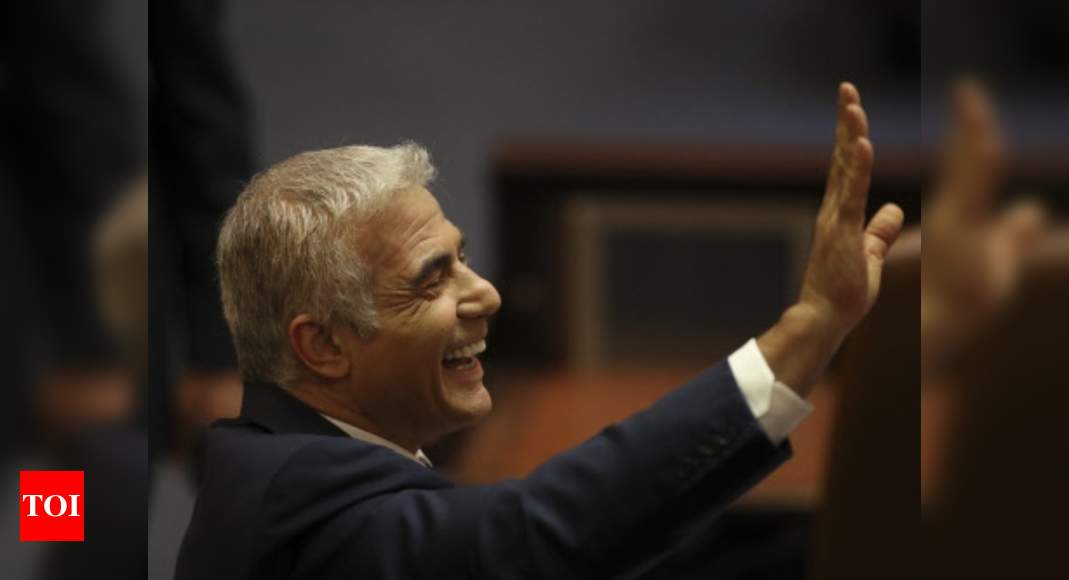Israel’s Lapid: From TV anchor to coalition architect – Times of India
[ad_1]
When Lapid founded his centrist Yesh Atid (There is a Future) party in 2012, some dismissed him as the latest in a series of media stars seeking to transform his celebrity status into political success.
But his fiercely secularist party finished second with 17 seats in March elections, Israel’s fourth inconclusive national vote in less than two years.
He was mandated last month to form a government after the prime minister, Benjamin Netanyahu, failed in his own efforts to build a post-election coalition.
And after pulling off what many had thought was impossible — cobbling together a coalition of bitter ideological rivals, ranging from right-wing religious nationalists to conservative Muslim Arab lawmakers — Lapid’s bloc was approved by the Knesset on Sunday.
That achievement was all the more remarkable given recent intercommunal clashes between Jewish and Arab citizens, sparked by the latest conflict between Israel and Hamas, the Islamist group that controls the Palestinian enclave of Gaza.
The coalition deal he brokered will now see Lapid assume the premiership only after a two-year stint at the top by his main coalition ally, nationalist hardliner Naftali Bennett.
Despite having engineered the alliance, 57-year-old Lapid will initially serve as foreign minister.
A former news anchor known for his chiselled good looks, Lapid is the Tel Aviv-born son of the fiercely secular former justice minister Yosef “Tommy” Lapid, another journalist who left the media to enter politics.
His mother, Shulamit, is a novelist, playwright and poet.
Lapid was a newspaper columnist who has also published a dozen books, and was a presenter on Channel 2 TV, a role that boosted his stardom.
An amateur boxer and martial artist, he once featured on lists of Israel’s most desirable men.
Yesh Atid had claimed a surprising 19 seats in Israel’s 120-member parliament back in 2013 polls, establishing it as a credible force in politics.
The party joined the centrist Blue and White alliance formed in 2019 under the leadership of former military chief Benny Gantz.
Blue and White then battled Netanyahu’s right-wing Likud in three elections in less than a year.
When Gantz decided last spring to enter a Netanyahu-led coalition, citing the need for unity as the coronavirus pandemic was gathering pace, Lapid bolted.
He accused Gantz of breaching a fundamental promise Blue and White had made to its supporters: that it would fight to oust Netanyahu.
In an interview with AFP in September, Lapid said Gantz had naively believed that Netanyahu would work collaboratively within the coalition.
“I told (Gantz), ‘I’ve worked with Netanyahu. Why don’t you listen to the voice of experience… He is 71 years old. He is not going to change’,” Lapid said.
After exiting Blue and White, Lapid took his seat in parliament as the head of Yesh Atid and leader of the opposition.
He described the short-lived Netanyahu-Gantz unity government as “a ridiculous coalition”, in which cabinet ministers who disliked each other did not bother to communicate.
He also predicted the coalition would collapse in December, which it did, amid bitter acrimony between Netanyahu and Gantz.
Now, attention will turn to how far the even more unwieldy government engineered by Lapid can endure before ideological tensions boil to the surface.
But it passed its first key test, gaining approval by the Knesset even after Netanyahu pulled out all the stops to try and thwart a successful confidence vote.
And while he’s the master behind the arrangement, Lapid has kept a low profile, presenting an even-keeled image of a man who aims to “unite” Israel.
“The Israeli public deserves a functioning and responsible government which places the good of the country at the top of its agenda,” he said in a statement prior to Sunday’s parliamentary vote.
“That’s what this unity government has been formed to do.”
[ad_2]
Source link


Comments are closed.